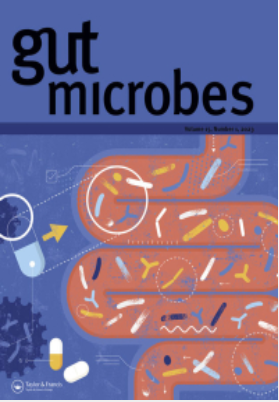益生菌菊粉通过调节肠道微生物群和短链脂肪酸控制 Th17 细胞介导的中枢神经系统自身免疫。
IF 12.2
1区 医学
Q1 GASTROENTEROLOGY & HEPATOLOGY
引用次数: 0
摘要
多发性硬化症(MS)是一种以中枢神经系统(CNS)发生炎性脱髓鞘为特征的自身免疫性疾病。菊粉是一种常见的益生元,可以通过调节肠道微生物群来改善代谢紊乱。然而,人们对其影响中枢神经系统自身免疫的能力认识不足。实验性自身免疫性脑脊髓炎(EAE)是多发性硬化症的经典小鼠模型。在这里,我们发现口服菊粉可改善小鼠 EAE 的严重程度,同时中枢神经系统中的炎症细胞浸润和脱髓鞘现象也有所减轻。这些减少与大脑和脾脏中 Th17 细胞比例和数量的减少有关。与研究结果一致的是,经菊粉治疗的EAE小鼠血清中IL-17、IL-6和TNF-α的浓度也有所降低。此外,体内针对 MOG35-55 抗原的自身反应性淋巴细胞的增殖也有所减弱。从机理上讲,菊粉治疗改变了肠道微生物群的组成。它增加了乳酸杆菌和杜博氏菌,而减少了g_Prevotellaceae_NK3B31_group属的数量,同时粪便和血清中的丁酸浓度也升高了。在体外,丁酸(而不是菊粉)能抑制 MOG35-55 刺激的淋巴细胞的活化。此外,粪便微生物群移植试验证实,菊粉处理过的正常小鼠的粪便内容物对 EAE 小鼠有改善作用。相反,抗生素鸡尾酒(ABX)治疗削弱了菊粉对 EAE 小鼠的治疗效果以及 Th17 细胞的减少,而补充重组人乳杆菌则恢复了改善效果。这些结果证实,菊粉对EAE小鼠Th17细胞和炎性脱髓鞘的抑制作用取决于其对肠道微生物群和代谢产物的调节作用。我们的研究结果为多发性硬化症患者补充益生菌菊粉提供了一种潜在的治疗方案。本文章由计算机程序翻译,如有差异,请以英文原文为准。
Prebiotic inulin controls Th17 cells mediated central nervous system autoimmunity through modulating the gut microbiota and short chain fatty acids.
Multiple sclerosis (MS) is an autoimmune disease characterized by inflammatory demyelination occurring in the central nervous system (CNS). Inulin is a common prebiotic that can improve metabolic disorders by modulating the gut microbiota. However, its capacity to affect CNS autoimmunity is poorly recognized. Experimental autoimmune encephalomyelitis (EAE) is a classical mouse model of MS. Herein, we found that oral administration of inulin ameliorated the severity EAE in mice, accompanied by reductions in inflammatory cell infiltration and demyelination in the CNS. These reductions were associated with decreased proportion and numbers of Th17 cells in brain and spleen. Consistent with the findings, the serum concentrations of IL-17, IL-6, and TNF-α were reduced in inulin treated EAE mice. Moreover, the proliferation of auto-reactive lymphocytes, against MOG35-55 antigen, was attenuated ex vivo. Mechanistically, inulin treatment altered the composition of gut microbiota. It increased Lactobacillus and Dubosiella whereas decreased g_Prevotellaceae_NK3B31_group at the genus level, alongside with elevated concentration of butyric acid in fecal content and serum. In vitro, butyrate, but not inulin, could inhibit the activation of MOG35-55 stimulated lymphocytes. Furthermore, fecal microbiota transplantation assay confirmed that fecal contents of inulin-treated normal mice had an ameliorative effect on EAE mice. In contrast, antibiotic cocktail (ABX) treatment diminished the therapeutic effect of inulin in EAE mice as well as the reduction of Th17 cells, while supplementation with Lactobacillus reuteri restored the amelioration effect. These results confirmed that the attenuation of inulin on Th17 cells and inflammatory demyelination in EAE mice was dependent on its modulation on gut microbiota and metabolites. Our findings provide a potential therapeutic regimen for prebiotic inulin supplementation in patients with multiple sclerosis.
求助全文
通过发布文献求助,成功后即可免费获取论文全文。
去求助
来源期刊

Gut Microbes
Medicine-Microbiology (medical)
CiteScore
18.20
自引率
3.30%
发文量
196
审稿时长
10 weeks
期刊介绍:
The intestinal microbiota plays a crucial role in human physiology, influencing various aspects of health and disease such as nutrition, obesity, brain function, allergic responses, immunity, inflammatory bowel disease, irritable bowel syndrome, cancer development, cardiac disease, liver disease, and more.
Gut Microbes serves as a platform for showcasing and discussing state-of-the-art research related to the microorganisms present in the intestine. The journal emphasizes mechanistic and cause-and-effect studies. Additionally, it has a counterpart, Gut Microbes Reports, which places a greater focus on emerging topics and comparative and incremental studies.
 求助内容:
求助内容: 应助结果提醒方式:
应助结果提醒方式:


